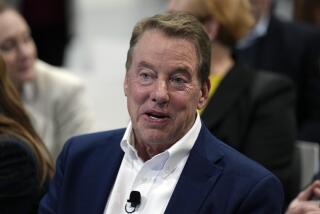Key sectors continue to gain strength
- Share via
WASHINGTON AND LOS ANGELES — Ford Motor Co.’s surprisingly strong quarterly earnings capped a day of upbeat news that showed the U.S. economy continuing to gain strength in key sectors including manufacturing and housing.
The only U.S. automaker to avoid filing for bankruptcy protection this year, Ford on Monday reported a nearly $1-billion profit from July to September, helped by cost-cutting, the government’s “cash for clunkers” program and strong demand for its new F-150 pickups.
But Ford’s strengthening financials underscore the major weakness plaguing the nascent economic recovery. Ford is gearing up to build more vehicles in the U.S. but has no plans to hire more workers to do it.
That’s weighing on the Obama administration, which is grappling with rising U.S. unemployment even as the overall economy has returned to growth. President Obama gathered with business leaders and other members of his Economic Recovery Advisory Board in Washington on Monday to help develop ways for the public and private sectors to work together to reverse the job losses. He called for “bold, innovative action.”
“Having brought the economy back from the brink, the question is how are we going to make sure that people are getting back to work and able to support their families,” Obama said as he convened the group’s second meeting, broadcast live on the Internet. “It’s not going to happen overnight, but we will not rest until we are succeeding in generating the jobs that this economy needs.”
Obama noted last week’s announcement that the economy grew at a 3.5% annual rate in the third quarter of the year, which signaled the unofficial end of the deep recession.
There were more positive developments Monday. Pending sales of existing homes increased for the eighth straight month in September, rising 6.1%, the National Assn. of Realtors said. September also was good for the building industry, as U.S. construction spending had its largest gain in a year, according to the Commerce Department. The key gauge of manufacturing, the Institute for Supply Management’s factory index, jumped more than expected in October, rising to a three-year high of 55.7.
And there was the unexpected profit at Ford. The automaker reported net income of $997 million, or 29 cents a share, for the three months that ended Sept. 30. That contrasted with a net loss of $161 million, or 7 cents a share, in the same quarter a year earlier. Wall Street had expected Ford to lose 12 cents a share.
“Our third-quarter results clearly show that Ford is making tremendous progress despite the prolonged slump in the global economy,” Chief Executive Alan Mulally said.
Ford expects to produce 570,000 vehicles in North America in the last three months of the year, up 141,000 compared with the fourth quarter of 2008. But executives said the increase wouldn’t result in any additional jobs.
Developments like that have the White House worried. The unemployment rate, already at a 26-year high of 9.8%, could hit double digits Friday when the government releases data for October.
“We anticipate that we’re going to continue to see some job losses in the weeks and months to come,” Obama said as the 16 members of the Economic Recovery Advisory Board gathered around a large table in the Roosevelt Room of the White House. Obama sat in the center on one side, flanked by former Federal Reserve Chairman Paul Volcker, the board’s head, and John Doerr, a partner in the Silicon Valley venture capital firm Kleiner, Perkins, Caufield & Byers.
The meeting focused on three areas -- raising U.S. exports, expanding environmentally friendly technology and increasing spending on infrastructure such as roads and bridges. The task is made harder by the federal government’s need to reduce its debt.
Although Obama called for bold and innovative action, the ideas discussed were not particularly new.
Doerr and others talked about launching an effort to retrofit U.S. homes and schools to be more energy efficient, which would increase jobs as well as lower energy costs. Robert Wolf, CEO of investment bank UBS Group Americas, recommended the creation of a national infrastructure bank that would pair public and private money to build roads, bridges and other infrastructure projects. Obama had advocated the idea during his presidential campaign.
Jeffrey Immelt, chief executive of General Electric Co., noted that because worker productivity increased in the face of economic pressures, companies would boost output even more once they resumed hiring. One solution is to increase sales of U.S. products abroad. Immelt noted that exports were 7% of U.S. economic output whereas they represented 40% of Germany’s economy.
“We may never get to Germany, but there’s no reason why we should be so low,” he said. Immelt suggested a goal of doubling exports as a percentage of U.S. economic output over a set period of time, which would create 3 million to 5 million jobs.
Ford said market share gains abroad and domestically, along with $1 billion in cost reductions in its car-making operations, helped drive the third-quarter profit. Its shares jumped more than 8% on Monday but gave up some gains in extended trading after an announcement that the company planned to issue $3 billion in convertible notes and stock to pay down debt and strengthen its balance sheet.
Ford reported that it made money in the crucial North American automotive market for the first time since the first quarter of 2005, turning a pretax operating profit of $357 million, compared with a loss of $2.6 billion a year earlier.
Ford said the government’s cash for clunkers program, which provided rebates to entice Americans to buy new cars, helped boost domestic sales. The company’s Focus compact and Escape sport utility vehicle were among the biggest sellers under the program.
However, Mulally said Ford also made higher profits on the vehicles it sold, partly because of strong consumer demand for its redesigned F-150 pickups, the revamped Taurus sedan and the Fusion hybrid.
Although Ford boosted its outlook for 2011, it remained cautious about 2010, saying it would provide further guidance when it released its fourth-quarter results. In addition, the United Auto Workers union Monday voted down more concessions in its contract with Ford, potentially putting the company at a disadvantage compared with General Motors Co. and Chrysler Group.
--
martin.zimmerman@latimes.com
More to Read
Inside the business of entertainment
The Wide Shot brings you news, analysis and insights on everything from streaming wars to production — and what it all means for the future.
You may occasionally receive promotional content from the Los Angeles Times.











